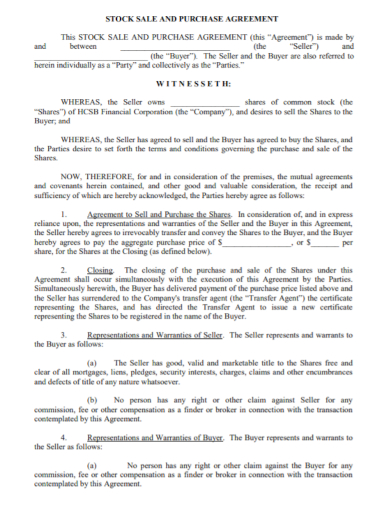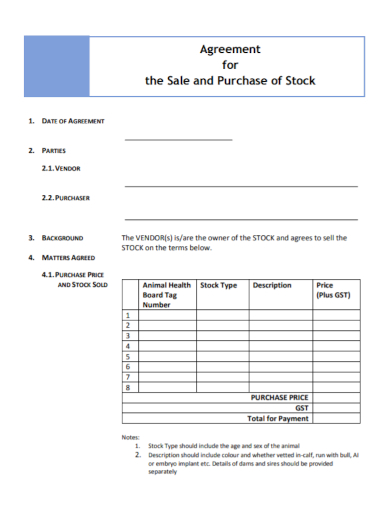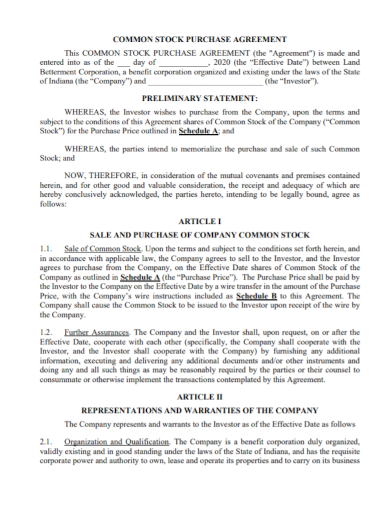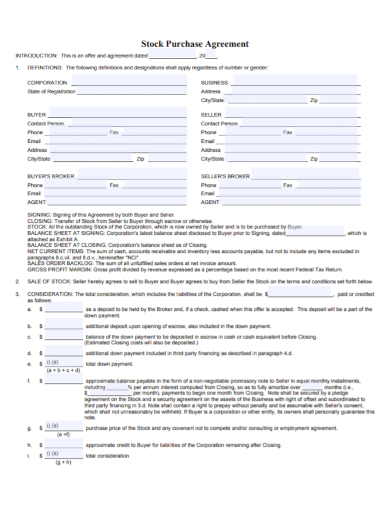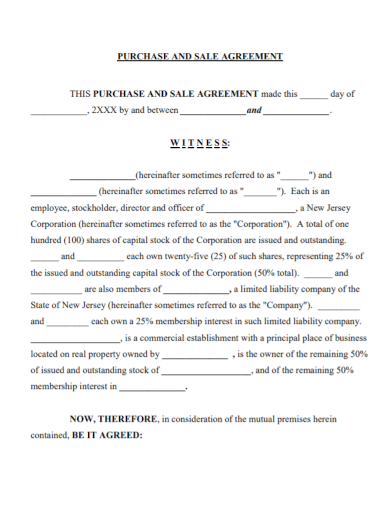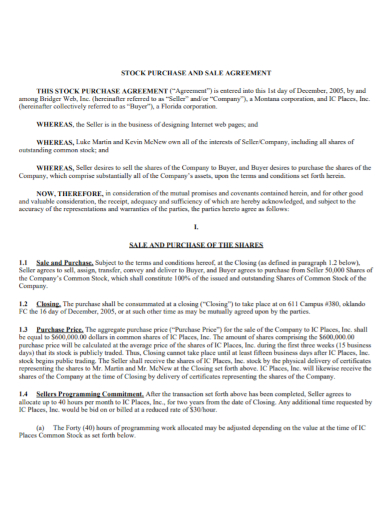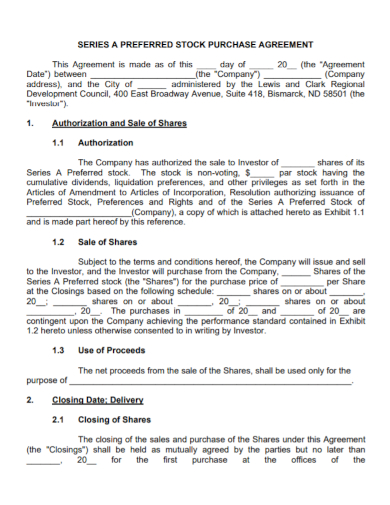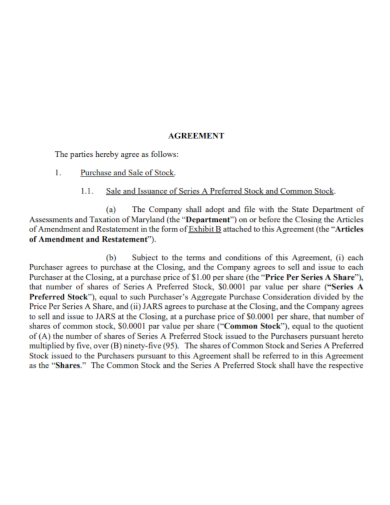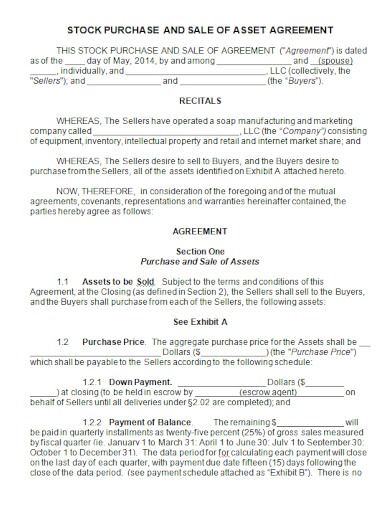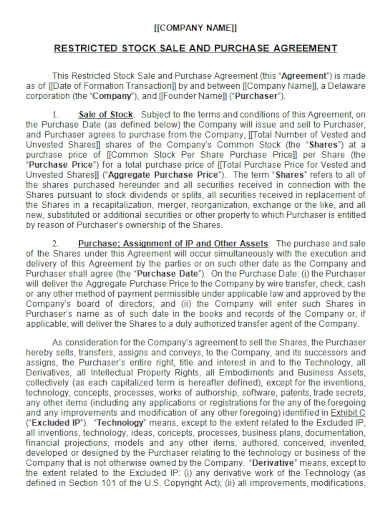9+ Stock Sale and Purchase Agreement Samples
Stock sale and purchase is the ongoing trend of the market right at this very moment. May it be short or long stocks, people are very much willing to invest especially if the market is up to earn more profit and could sustain life inflations. Having a “long” position in a security means that you own the security. Investors maintain “long” security positions in the expectation that the stock will rise in value in the future. The opposite of a “long” position is a “short” position. A “short” position is generally the sale of a stock you do not own. Investors who sell short believe the price of the stock will decrease in value. If the price drops, you can buy the stock at the lower price and make a profit. If the price of the stock rises and you buy it back later at the higher price, you will incur a loss. Short selling is for the experienced investor. Whether it is a long or short sell transaction, the whole process needs to be formalized and well-documented by securing a Stock Sale and Purchase Agreement. To avoid doing this from scratch, our site offers you free, available and ready-made yet customizable templates that can help you with your template needs,
For other agreement templates, our site is offering you these agreement templates that you can utilize when needed: Employee Equipment Agreement, Vendor Purchase Agreement, Vendor Merchandise Agreement, Vendor Service Agreement, Training Services Agreement, Teacher Agreement, Workshop Service Agreement, Student Teaching Agreement, Product Sales Agreement, Farm Land Lease Agreement, etc. This article will not only give you templates but also necessary information that you need to know for your teacher employment agreement/ contract. So come on, explore this article with me!
1. Stock Sale and Purchase Agreement
2. Agreement for Sale and Purchase of Stock
3. Company Stock Sale and Purchase Agreement
4. Corporate Stock Sale and Purchase Agreement
5. Capital Stock Sale and Purchase Agreement
6. Stock Shares Sale and Purchase Agreement
7. Preferred Stock Sale and Purchase Agreement
8. Common Stock Sale and Purchase Agreement
9. Stock Purchase and Sale of Asset Agreement
10. Restricted Stock Sale and Purchase Agreement
What Is Short Selling?
Short selling is an investment or trading strategy that speculates on the decline in a stock or other security’s price. It is an advanced strategy that should only be undertaken by experienced traders and investors. Traders may use short selling as speculation, and investors or portfolio managers may use it as a hedge against the downside risk of a long position in the same security or a related one. Speculation carries the possibility of substantial risk and is an advanced trading method. Hedging is a more common transaction involving placing an offsetting position to reduce risk exposure.
In short selling, a position is opened by borrowing shares of a stock or other asset that the investor believes will decrease in value. The investor then sells these borrowed shares to buyers willing to pay the market price. Before the borrowed shares must be returned, the trader is betting that the price will continue to decline and they can purchase them at a lower cost. The risk of loss on a short sale is theoretically unlimited since the price of any asset can climb to infinity.
Pros and Cons of Short Selling
Selling short can be costly if the seller guesses wrong about the price movement. A trader who has bought stock can only lose 100% of their outlay if the stock moves to zero. However, a trader who has shorted stock can lose much more than 100% of their original investment. The risk comes because there is no ceiling for a stock’s price, it can rise “to infinity and beyond”—to coin a phrase from another comic character, Buzz Lightyear. Also, while the stocks were held, the trader had to fund the margin account. Even if all goes well, traders have to figure in the cost of the margin interest when calculating their profits.
Pros
- Possibility of high profits
- Little initial capital required
- Leveraged investments possible
- Hedge against other holdings
Cons
- Potentially unlimited losses
- Margin account necessary
- Margin interest incurred
- Short squeezes
FAQs
What are sales of stock?
In contrast, stock sales involve the selling and purchase of shares of stock from the existing business’ shareholders. The buyer purchases the equity in the company, assuming all assets and liabilities.
How does a stock sale work?
Through a stock sale, the buyer purchases the selling shareholders’ stock directly thereby obtaining ownership in the seller’s legal entity. The actual assets and liabilities acquired in a stock sale tend to be similar to that of an assets sale.
What are common stock sales?
The actual sale of common stock is a pretty simple process. Just place the sell order with your broker, and she handles the details and credits your account with the proceeds. However, shares of common stock are a capital asset, and you’ll end up with a taxable gain or deductible loss when you sell them.
Related Posts
FREE 10+ Trial Agreement Samples In MS Word | Google Docs | Apple Pages | PDF
FREE 9+ Shop Rental Agreement Samples [ Commercial, Lease, Tenancy ]
FREE 10+ Charter Agreement Samples In MS Word | Google Docs | Apple Pages | PDF
FREE 10+ Mentoring Agreement Samples In MS Word | Apple Pages | PDF
FREE 10+ Partner Agreement Samples In MS Word | Google Docs | Apple Pages | PDF
FREE 10+ Individual Agreement Samples In MS Word | Google Docs | Apple Pages | PDF
FREE 10+ Strategic Agreement Samples In MS Word | Google Docs | Apple Pages | PDF
FREE 10+ Equity Agreement Samples In MS Word | Google Docs | Apple Pages | PDF
FREE 10+ Producer Agreement Samples in MS Word | Apple Pages | PDF
FREE 10+ Grant Agreement Samples In MS Word | Apple Pages | PDF
FREE 8+ Meeting Agreement Samples in MS Word | Google Docs | Apple Pages | PDF
FREE 10+ Community Agreement Samples In MS Word | Google Docs | PDF
FREE 8+ Real Estate Option Agreement Samples in MS Word | PDF
FREE 10+ Call Option Agreement Samples In MS Word | PDF
FREE 10+ Advertising Agreement Samples In MS Word | Google Docs | Apple Pages | PDF

